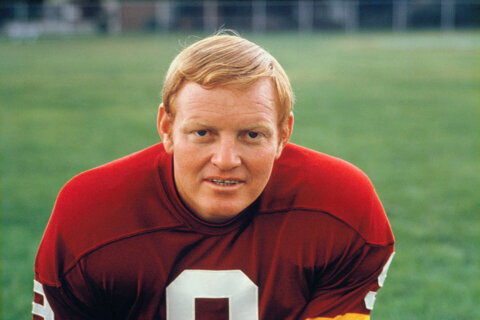WASHINGTON — As many Washington sports fans can relate, Game 5 has not been kind to me. But we only share a small portion of that misery. My relationship with Game 5 — specifically Game 5 of Major League Baseball’s Division Series round — has been particularly brutal.
The Division Series round has only been around since the 1995 postseason. Of the 87 completed Division Series since then, 26 of them have gone the full five games. Of those 26, 15 have featured the home team losing Game 5 on their own field, the fans watching their season end in front of them when a win would have propelled them on in search of a title. Of those 15, my team has been that home loser six times, and has never been the winner.
I’m an Oakland Athletics fan. The A’s practically wrote the instructional manual on Game 5 heartbreak, dropping the fifth game of the ALDS at home in Oakland in 2000 to the Yankees, in 2002 to the Twins, and in 2003 to the Red Sox after leading 2-0 (they also lost Game 5 on the road at Yankee Stadium in 2001 after leading 2-0 that year, as well). A decade later, they started teaching graduate work on the same kind of heartbreak with a Game 5 futility revival tour, getting shut out by Justin Verlander in 2012’s ALDS Game 5 in Oakland, then suffering the same fate — at Verlander’s hands once again — the very next year.
The astute among you will note that I have only described five Game 5 losses in the paragraph above. That’s because I have a different, special kind of relationship with the Game 5 you are probably most familiar with, if you’re reading this article. On Friday, Oct. 12, 2012, less than 24 hours removed from watching the first of Verlander’s death blows, I was in the press box at Nationals Park, as I had been all season long, running the home team’s Twitter account.
So when the Nats shot out to a 6-0 lead, turning South Capitol Street into a red-clad, 46,000-person block party, I breathed deeply, optimistic but weary. When Gio Gonzalez started to struggle, giving a run back in the fourth, I felt my stomach start to cramp. My phone was erupting, but I was dutifully ignoring it, right up until a text came through from my best friend’s dad, a fellow A’s fan, with whom I hadn’t spoken in a while. He still lives back in the Bay Area, where I grew up, but his son, my friend, lives in Chicago. What could he have to tell me at this particular moment?
“I’m going to fly Chris back to San Francisco for the NLCS!”
Oh. Oh no.
The Giants, who had already advanced, were awaiting the winner of this series. We were 15 outs away with a 5-run lead, and already the overwhelming sense of dread had consumed me. My worst fears were realized inning by agonizing inning, through Davey Johnson summoning Edwin Jackson and his 6.97 first-inning ERA to pitch in relief, and Daniel Descalso’s solo shot off Tyler Clippard to open the eighth. Still, when Kurt Suzuki bounded a two-out single up the middle to score Adam LaRoche with an enormous insurance run, I thought we might escape.
There’s no need to rehash what happened next, just suffice it to say the feeling was familiar. I walked down the ramps among the shellshocked fans, because I couldn’t bear to take the press elevator. Eventually I worked my way back to the offices, where co-workers stayed late into the night commiserating over what had happened, over an emotion they had never felt before. I had been through this all too many times before, I told them. But I didn’t bother to mention that this time was the worst. I went home, crashing into a miserable sleep.
I awoke to an email, a request from the powers that be to write something for the fans, who had been so full of hope just one day prior. I did the best I could, channeling the magic of that season, knowing it would never quite be the same. But to be a good team with championship aspirations means to face these moments, and to be ready to embrace their outcome, for better or for worse.
The cruelty of Game 5 is that winning it simply means you advance, with two more rounds between you and your goal. Losing it means the end of your season, a sharp jolt from your dreams. The potential payoff isn’t equal to the potential cost. This only makes our investment in its outcome that much more unfair.
You can choose to dwell on your history, on 2012, on failures of Washington’s football or hockey teams, on 18 years since any D.C. team has advanced to the semifinal round of its respective championship ladder. Or you can look at the nine innings that separate your team from either the next round or the golf course, know that it is only that — nine innings, with your best pitcher starting on the mound — and just run with it.
The only real good news will come from a win Thursday night. Any feeling short of that is jumping straight to the bargaining stage of the grief cycle. But know this — you shouldn’t fear Game 5, because you’ve already been through the worst possible outcome. I would know.







